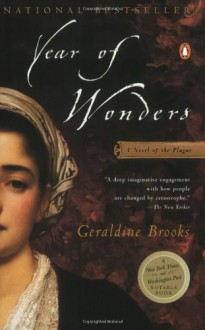




I won't spoil it for anyone but the amount I love this book is amazing! The writing, the main character. I just can't explain it in words( that's ironic). To this day, so many years after first reading it I still recommend it to people and gift it to friends or family members that want to read something a little deeper than the average Fiction story. If I lend out my copy and the borrower for whatever reason can't return it, this is one of the few books I will always rebuy if necessary!

I came to this book by an NPR article discussing pandemic lit. It's a fictionalized tale of the real English town that, struck by plague in 1665, chose to sacrifice themselves by quarantining the town in hopes of preventing the spread of disease to their neighbors.
At least, that's the framework for the story, but the real story is its characters and how they respond to the crisis, how they endure or find strength or break as they lose their neighbors and loved ones. How for some, it's business and opportunism as usual as they use legal means to take a valuable mine from an orphaned child because her dead father can no longer work it or defend it, or price-gouging for grave-digging services when the church graveyard is full and there is a shortage of able-bodied men. How the taverns are always full and the fearful mob inevitably looks for witches to burn.
But it's also the story of neighbors looking out for each other, of a mother rising above the grief of her lost children to care for the dying and deliver the new babies when the doctors flee the town, of the religious leaders look past their fundamental differences to provide leadership to people in need, how a pastor and his wife work tirelessly to minister to the whole town, good or evil of spirit, deserving and undeserving.
There are some odd twists at the end that surprised and angered and disappointed me, but overall the story had me fascinated throughout.
Audiobook via Overdrive, and I strongly recommend you do NOT do this one on audio, because it's read by the author who may be a very good writer but is a terrible narrator, and yet I was so engaged with the story that even her droning voice couldn't put me off.

This engrossing read traces the fictionalized history of a real-life ancient Jewish manuscript found in Sarajevo, Bosnia and the people – Jews, Muslims and Christians – who shaped its destiny, from the 15th century up to the present day. The details about the restoration and conservation of old books are quite fascinating. Richly steeped in history and meticulously researched, the story jumps back and forth between chapters set in different countries and eras with different characters. Some of these characters are sympathetic and likeable, some others not so much (one example of the latter is Hanna, the main character in the present era, who comes across as annoyingly judgmental to me). When reading novels structured like this I would sometimes be more drawn to certain story lines more than the others, but Brooks spins her tale so well that after a few pages of each new chapter I always found myself captivated, no matter how I may feel about the characters. I've had a secondhand copy of this book in my stacks for years but only got to it this year, when it's starting to look like it's well on its way to becoming an ancient manuscript itself. I'm very glad I gave it a chance.